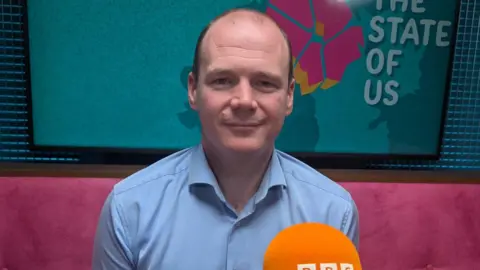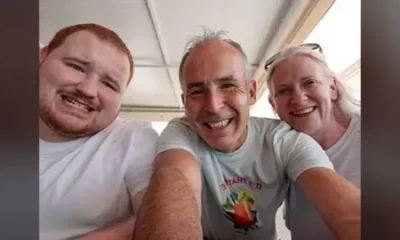Breaking News
Racial tensions fuelled by housing shortage, says minister
Read more on post.
Racial tensions in Northern Ireland are being fuelled by a shortage of housing, the communities minister has said.
Gordon Lyons, whose department oversees housing, said there is “absolutely no excuse for the racism”, but he can “fully appreciate and understand why in many communities… [people] are really concerned about what is happening”.
He added that these concerns are born out of some people waiting “years” for social housing, meanwhile people seeking asylum are given accommodation in their community.
The latest Home Office statistics, as of June 2025, show that 2,228 people were housed in what is called “dispersal” accommodation.
This type of accommodation is longer-term temporary housing, managed on behalf of the Home Office by private operators.

Lyons said this accommodation tended to be “in communities where housing is cheaper” and is not “evenly spread throughout Northern Ireland”.
“It tends to be in those areas that are already deprived, that there is already pressure,” he told The State of Us podcast.
In June, the streets of Ballymena in County Antrim saw several nights of violence disorder, described by police as “racist thuggery, pure and simple“.
A Home Office spokesperson said: “Over the past year, we have cut hotel spending by over half a billion pounds by speeding up asylum decisions, returning more than 35,000 people with no right to remain, and working closely with local authorities to close all asylum hotels by the end of this parliament.”
Problem ‘massively needs addressed’
Louise McCullough, the chairperson of east Belfast community charity Elevate East, said the housing situation “relates very closely to a lot of the social issues”.
“People are upset that someone from out of the area has been given a house in the area that several families had their eye on, for example,” she said.
“And I really want to impress on people that the issue is not that an out-of-area family got that one house, this issue is that it’s only one house.”
Ms McCullough told The State of Us that Northern Ireland’s housing problem “massively needs addressed”.
“We have a huge homeless population, people are living on top of each other, overcrowding, and there is a real opportunity there,” she said.
“We need to be looking at the people who are making the decisions about building houses.”

Lyons said he is “looking at all of the different levers” available to him to increase housing supply.
“There’s nothing more fundamental than housing,” he added.
The minister highlighted one proposal he would be bringing to the executive is to use “surplus land” owned by the public sector to build more social homes.
“We have public sector land right across Northern Ireland, it’s about the size of County Armagh,” he said.
“To build social homes we need some form of subsidy, if we can’t get cash subsidy I’m asking that the executive give me some land so that I can build.”
The minister said this would “open up huge additional capacity” for housing.
The Programme for Government committed to starting work on at least 5,850 new-build social homes by 2027.
That equates to about 2,000 new building starts per year.
However, on the basis of the current budget, the number of homes started this year will be lower than the 1,504 started last year.
Figures published at the end of August, show in the second quarter of this year 49,129 households in Northern Ireland were on a social housing waiting list.
Breaking News
Racial tensions fuelled by housing shortage, says minister
Read more on post.
Racial tensions in Northern Ireland are being fuelled by a shortage of housing, the communities minister has said.
Gordon Lyons, whose department oversees housing, said there is “absolutely no excuse for the racism”, but he can “fully appreciate and understand why in many communities… [people] are really concerned about what is happening”.
He added that these concerns are born out of some people waiting “years” for social housing, meanwhile people seeking asylum are given accommodation in their community.
The latest Home Office statistics, as of June 2025, show that 2,228 people were housed in what is called “dispersal” accommodation.
This type of accommodation is longer-term temporary housing, managed on behalf of the Home Office by private operators.

Lyons said this accommodation tended to be “in communities where housing is cheaper” and is not “evenly spread throughout Northern Ireland”.
“It tends to be in those areas that are already deprived, that there is already pressure,” he told The State of Us podcast.
In June, the streets of Ballymena in County Antrim saw several nights of violence disorder, described by police as “racist thuggery, pure and simple“.
A Home Office spokesperson said: “Over the past year, we have cut hotel spending by over half a billion pounds by speeding up asylum decisions, returning more than 35,000 people with no right to remain, and working closely with local authorities to close all asylum hotels by the end of this parliament.”
Problem ‘massively needs addressed’
Louise McCullough, the chairperson of east Belfast community charity Elevate East, said the housing situation “relates very closely to a lot of the social issues”.
“People are upset that someone from out of the area has been given a house in the area that several families had their eye on, for example,” she said.
“And I really want to impress on people that the issue is not that an out-of-area family got that one house, this issue is that it’s only one house.”
Ms McCullough told The State of Us that Northern Ireland’s housing problem “massively needs addressed”.
“We have a huge homeless population, people are living on top of each other, overcrowding, and there is a real opportunity there,” she said.
“We need to be looking at the people who are making the decisions about building houses.”

Lyons said he is “looking at all of the different levers” available to him to increase housing supply.
“There’s nothing more fundamental than housing,” he added.
The minister highlighted one proposal he would be bringing to the executive is to use “surplus land” owned by the public sector to build more social homes.
“We have public sector land right across Northern Ireland, it’s about the size of County Armagh,” he said.
“To build social homes we need some form of subsidy, if we can’t get cash subsidy I’m asking that the executive give me some land so that I can build.”
The minister said this would “open up huge additional capacity” for housing.
The Programme for Government committed to starting work on at least 5,850 new-build social homes by 2027.
That equates to about 2,000 new building starts per year.
However, on the basis of the current budget, the number of homes started this year will be lower than the 1,504 started last year.
Figures published at the end of August, show in the second quarter of this year 49,129 households in Northern Ireland were on a social housing waiting list.










